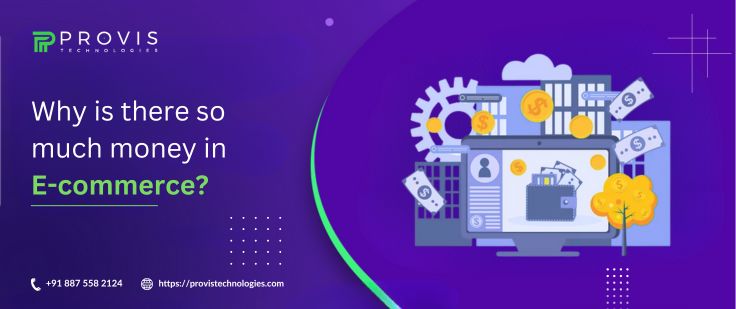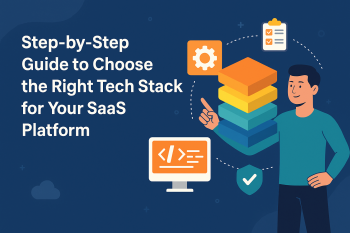E-commerce means doing business online. E-commerce stands for Electronic Commerce – where electronic serves the meaning via digital mediums and commerce as an activity of buying & selling.
In today’s modern digital environment, e-commerce is an ocean of opportunities. With over 65% of the population accessing the internet, it’s no surprise that most business now happens online. E-commerce is reshaping the way businesses engage with customers and sell. It’s a fundamental evolution in consumer behavior – and the credit also goes to the top e-commerce developers. Let’s understand why businesses should wholeheartedly embrace e-commerce as a cornerstone of their operations. But before we reach the reasons, check out these fascinating stats.
E-Commerce Statistics
Global E-commerce Sales Growth
E-commerce sales are projected to reach $6.4 trillion by 2024, a significant increase from $3.53 trillion in 2019. This growth underscores the expanding influence and importance of the e-commerce sector in the global economy.
[Source: Statista – Global E-commerce Sales 2014-2024]
Mobile E-commerce Dominance
Mobile commerce (m-commerce) accounts for a substantial portion of online sales, with 72.9% of all e-commerce sales expected to be conducted via mobile devices by 2021. This highlights the critical role of mobile optimization in driving e-commerce success.
[Source: eMarketer – Worldwide Retail & E-commerce Sales]
Consumer Preference for Online Shopping
87% of consumers begin their product search online, indicating a strong inclination towards online shopping channels. This trend suggests the importance of establishing a robust online presence to capture consumer interest and engagement.
[Source: Salesforce – E-commerce & the Digital Store]
Impact of Personalization on Purchase Intent
Personalized product recommendations can increase conversion rates by up to 26%, highlighting the significant influence of tailored experiences on consumer purchasing behavior. Investing in customized marketing strategies can yield substantial returns in driving e-commerce sales.
[Source: Barilliance – Personalization Stats for E-commerce]
Rise of Social Commerce
Social media platforms play a pivotal role in driving e-commerce sales, with 54% of social media users utilizing these platforms to research products. Moreover, 30% of online shoppers indicate that they would purchase directly from a social media platform, underscoring the emergence of social commerce as a potent sales channel.
[Source: GlobalWebIndex – Social Media Commerce Report 2021]
Top Reasons Why Businesses Should Do E-Commerce
Global Reach & Market Expansion
One of the most exciting aspects of e-commerce is its ability to surpass geographical boundaries and connect businesses with a global audience. Unlike traditional trading ways constrained by physical locations, e-commerce platforms offer unparalleled accessibility to consumers worldwide. Whether your business operates from the bustling streets of New York City or the serene corners of rural countryside – the internet becomes your gateway to a vast marketplace. Take, for instance, the success story of a small artisanal jewelry maker based in a village. Through an e-commerce website, they could showcase their unique creations to customers not in their area only but also worldwide – skyrocketing their business and name.
Cost-effectiveness & Reduced Overheads
The e-commerce boom is not just due to its expansive reach only but because of its cost-effectiveness also. Traditional brick-and-mortar businesses entail significant expenses, from rent to utility bills and staffing costs. In contrast, setting up an e-commerce operation requires a fraction of the investment, with no need for physical storefronts or extravagant interior décor. This translates to substantial savings, allowing businesses to allocate resources more efficiently towards product innovation, marketing endeavors, or enhancing customer experience. Furthermore, the scalability offered by e-commerce platforms enables businesses to expand their operations without the burden of hefty infrastructure investments, thus cost-effectively fostering organic growth.
24/7 Availability & Convenience
In an era characterized by hectic lifestyles and round-the-clock connectivity, convenience & availability are everything. E-commerce caters precisely to this demand by offering consumers the flexibility to browse and shop at their convenience, irrespective of time or location. Whether it’s a late-night impulse purchase or a leisurely weekend shopping spree, the virtual storefront is always open to fulfill the needs & fancies of shoppers. This exceptional accessibility enhances the overall shopping experience and fosters customer loyalty by accommodating diverse preferences & time zones. Moreover, the convenience factor extends beyond mere accessibility, encompassing hassle-free payment options, doorstep delivery, and hassle-free returns – thereby elevating the entire shopping journey to new heights of comfort & satisfaction.
Personalized Customer Experience
In the digital world, data is the bedrock for personalized customer experiences. With data analytics & AI-driven algorithms, businesses can gain valuable insights about consumer behavior, preferences, and purchasing patterns. Armed with this wealth of information, they can tailor offerings & marketing strategies according to their needs. From personalized product recommendations based on past purchases to targeted promotional campaigns tailored to specific demographics – you have a glorious edge. This enhances the relevance of marketing efforts and develops a sense of connection between businesses & customers.
Data-driven Decision Making & Business Intelligence
E-commerce empowers businesses with a treasure of data, enabling them to know market trends and competitive dynamics. By leveraging advanced analytics tools, e-commerce owners can see hidden patterns to identify opportunities and avoid potential risks with precision. Whether it’s about optimizing inventory management, refining pricing strategies, or fine-tuning marketing campaigns – data-driven decision-making becomes the cornerstone of strategic competitiveness in e-commerce. You can’t see these in offline business.
Don’t Miss:- Boost Your Brand with Custom E-commerce Solutions
Enhanced Customer Service & Communication
In e-commerce, customer service is an unmatchable advantage. With real-time communication channels, businesses can elevate the customer experience to new levels. Resolving queries, addressing complaints, or soliciting feedback – teams can engage with customers in a personalized manner. Moreover, chatbots & virtual assistants further streamline customer interactions, ensuring round-the-clock support without compromising quality.
Adaptation to Changing Consumer Behavior
E-commerce is a dynamic line for businesses to adapt and thrive amidst these changing times. As consumers gravitate towards online shopping preferences, companies that embrace e-commerce gain a competitive edge by aligning with shifting market trends. Moreover, e-commerce with social media and mobile platforms further amplifies its reach and relevance, enabling businesses to stay ahead of the curve.
Competitive Advantage & Innovation
In this modern commerce environment, innovation is the lifeblood that sustains growth & competitiveness. E-commerce empowers businesses to innovate product offerings and marketing strategies. Firms can leverage the expansive canvas of e-commerce to carve out a distinct competitive advantage. Moreover, by embracing e-commerce, businesses can tap into a global marketplace teeming with opportunities, thus unlocking new avenues for growth that transcend traditional boundaries of success.
Bottom Line
The journey towards embracing e-commerce is not merely a technological transition; it’s a strategic imperative that holds the key to unlocking limitless opportunities to prosper. From global reach & cost-effectiveness to personalized customer experiences & data-driven insights – the benefits of e-commerce are unignorable. By embracing e-commerce, businesses can adapt to the changing tides of consumer behavior and thrive. So, embark on a transformative journey toward sustainable success in this digital age. You can also shake hands with top e-commerce developers like Provis Technologies and start your online venture.
FAQs
What is e-commerce?
E-commerce refers to the online buying-selling of products. From online retail stores to digital marketplaces & online auctions – all are examples of e-commerce.
Why should businesses consider e-commerce?
Global reach, cost-effectiveness, and 24/7 availability – e-commerce allows businesses beyond traditional limitations. You can reach a wider audience, reduce operational expenses, and remain accessible to customers round-the-clock.
How does e-commerce benefit consumers?
E-commerce benefits consumers by offering convenience, personalized experiences, and a vast catalog. With e-commerce, consumers can shop from the comfort of their homes and enjoy custom recommendations based on their preferences & past interactions, all at their fingertips.
What role does data play in e-commerce?
Data is crucial in e-commerce for informed decision-making and enhancing the overall customer experience. Businesses gain a deeper understanding of consumer behavior, enabling them to tailor their offerings to better meet customer expectations – all through data analytics.
Is mobile commerce (m-commerce) important?
Yes! Mobile commerce is critically important in today’s digital space. A significant portion of online shopping now occurs via mobile platforms. Businesses that optimize their e-commerce websites for mobile devices can capitalize on this trend, driving higher conversion rates and sales.
How can businesses use social media for e-commerce?
Businesses can use social media platforms to engage with customers, showcase products, and drive sales. Social media offers opportunities to build brand awareness and create targeted advertising campaigns. With shoppable posts, live shopping, and direct purchasing options – businesses can smoothly integrate e-commerce functionalities into their social media presence, turning social interactions into valuable sales opportunities.
How so much money is in E-Commerce?
The vast amount of money in e-commerce can be attributed to the factors below:
- The global reach of e-commerce enables businesses to access a much larger market than offline stores, leading to increased sales opportunities.
- The cost-effectiveness of e-commerce, with lower overhead costs than physical retail, translates into higher profit margins for businesses.
- The convenience & accessibility offered by e-commerce platforms attracts a growing number of consumers, driving up transaction volumes and revenue.
- The continuous advancements in technology and digital infrastructure further fuel the growth of e-commerce, paving the way for innovative business models and revenue streams.
How do I get e-commerce for my business? How can I take my business online?
There are many ways to do it – among them, the best is to hire an e-commerce development agency like Provis Technologies. They are the ones who establish offline businesses on the internet – managing A to Z e-commerce solutions.
Written By
Author's Picks
- Top Features every successful E-Commerce Website needs in 2024
- 24/11/2024
- Top Customer Service Software Platforms for E-commerce Success
- 21/01/2025
- Boost Your Brand with Custom E-commerce Solutions
- 26/04/2024
Categories
- AI for Startups
- AI in Web Development
- AI Integration
- AI Platforms
- AI Prompt
- AI Tools
- AI Trading Software
- Android App
- Android vs iOS Development
- Angular
- API
- API Development
- App
- app development
- App Idea
- App User Feedback
- Application
- Artificial Intelligence
- Audit Services
- Automotive Industry
- Awards and Recognition
- Business Consulting
- Business Website
- Chatbots
- CRM
- CRM for Financial Advisors
- Custom CRM
- Custom SaaS
- Custom Website
- Customer Service
- dashboard design
- Developing a Mobile App
- Digital Business
- E-commerce
- EMR Integration
- Finance
- Financial Advisors
- Financial Advisors
- GIT
- Health Insurance
- iOS App
- iOS App Development
- IoT Mobile App Development
- IoT Platforms
- IT Audit Services
- IT Consulting
- IT Strategies
- Java Development
- Laravel
- Lean Canvas
- Learning Management System
- Logistics Apps
- Mobile App Development
- MVP
- Native App
- News Aggregator Site
- OTT
- Outsourcing IT
- Payment Gateway
- predictive analysis
- Product Launch Strategy
- Progressive Web App (PWA)
- Prototype
- Recommender Systems
- Ruby
- SaaS
- SaaS Application
- SaaS Business
- SaaS Company
- SaaS Development
- SaaS Product
- SaaS Project
- Sales Funnel
- SEO
- Shopping Cart
- Software Development
- SSL and TLS
- Startup Checklist
- Technology
- Tetradic Color Scheme
- UI/UX Design Company
- Unit Testing
- User Flow
- User Testing
- Web Development
- Web Performance Optimization
- website Maintenance Services
- Website Migration Service
- Website Speed Optimization
- WooCommerce
- WordPress





